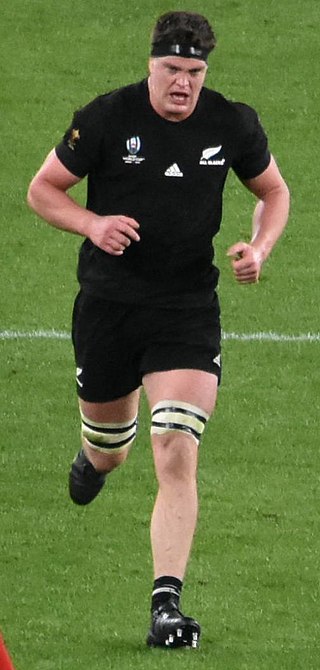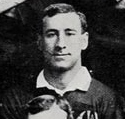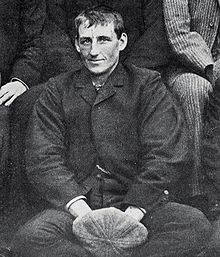Playing career
Hunter was from a farming family in Taranaki, and attended Wanganui Collegiate. He then joined the Hawera Rugby Club and was selected to play for Taranaki in 1898 at the age of 18. [2] He played in almost every position in the Taranaki backline before settling on second five-eighth. [3] He continued to play for Taranaki and played for them against the touring Great Britain team that toured New Zealand in 1904. He was also selected to play for the All Blacks to play the one Test match against Great Britain, but after an injuring himself the day before the match, he was replaced. [3] He was first selected for the North Island team in the annual inter-island match that year as well. In 1905 he captained the North Island to a 26–0 victory over the South Island; the match was also used as a trial for the All Blacks team to tour the British Isles that year. [4]
He was selected for the New Zealand team that toured the New Zealand and Australia that July. This was a preliminary tour and Hunter was appointed captain. Although there were seven matches, Hunter only played in three. [4] He was selected for the final squad the tour the Northern Hemisphere, but was replaced by Dave Gallaher as captain and Billy Stead as vice-captain. [5] The team became famously known as The Original All Blacks, and played a total of 35 matches.
The first of Hunter's 24 matches on tour was the match against Devon in Exeter. [1] He scored eight tries in his first four games on tour, [6] and after nine games had scored 23. [7] He twice scored five tries in a single match on the tour, the first of which was against Northumberland. The second was when they played Oxford University, and the Morning Leader wrote "Hunter was the most destructive medium on attack and his personal tally was five tries. One half of this little wonder's tricks have not been told yet and the Oxford men were simply paralysed by his tenacity." [8] His next match was against Richmond. Hunter played at half-back for that match, and the Athletic News wrote of his performance "it could only be a player like Hunter who, by the way, was brought to halfback, who could have got through the stonewall arrangements by which Richmond defied the New Zealanders for 30 minutes." [9]
Hunter did play in the All Blacks all five Tests on the tour, including the famous Match of the Century , a 3–0 loss to Wales. His first ever Test was the 12–7 victory over Scotland, and his first ever Test try was scored against France when he scored two in the All Blacks 38–8 victory. [1] Hunter finished the tour with 44 tries which is described by writer Paul Verdon as "a sensational feat that has never been approached in the near-century of New Zealand tours and is most unlikely ever to be." [3]
He continued to play for Taranaki, the North Island and the All Blacks following the tour, and captained the All Blacks in their 1907 tour of Australia. [5] He captained all three Tests against Australia; the first two won 26–6 and then 14–5 and the third drawn 5–5. [1] Hunter then played in all three Tests against the Anglo-Welsh team that toured New Zealand in 1908, and captained the second. [5] Following the 1908 season he retired from active play. After his retirement he farmed at Mangamahu. His homestead was called Oeta and is still in existence.

The New Zealand national rugby union team, commonly known as the All Blacks, represents New Zealand in men's international rugby union, which is considered the country's national sport. Famed for their international success, the All Blacks have often been regarded as one of the most successful sports teams in history.

In 2005, the British & Irish Lions rugby union team toured New Zealand for the first time since 1993, playing seven matches against first and second division teams from the National Provincial Championship, one match against the New Zealand Maori team, and three test matches against New Zealand. The Lions lost the test series 3–0, the first time in 22 years that they lost every test match on tour.
Mark Gordon Ella, AM is an indigenous Australian former rugby union footballer. Ella played at flyhalf/five-eighth and was capped by the Wallabies 25 times, captaining Australia on 10 occasions.

David Gallaher was an Irish-born New Zealand rugby union footballer best remembered as the captain of the "Original All Blacks"—the 1905–06 New Zealand national team, the first representative New Zealand side to tour the British Isles. Under Gallaher's leadership the Originals won 34 out of 35 matches over the course of tour, including legs in France and North America; the New Zealanders scored 976 points and conceded only 59. Before returning home he co-wrote the classic rugby text The Complete Rugby Footballer with his vice-captain Billy Stead. Gallaher retired as a player after the 1905–06 tour and took up coaching and selecting; he was a selector for both Auckland and New Zealand for most of the following decade.
Mark Richard Allen, commonly known as Bull Allen, is a New Zealand former rugby union footballer and TV celebrity, reaching iconic status on the New Zealand sports scene in the 1990s. As well as 19 games and 8 test match appearances for New Zealand, Allen played 110 games for Taranaki and was captain of the inaugural Wellington Hurricanes Super 12 team. He was also captain of the first and short-lived Central Vikings team.

Billy Stead, born John William Stead, was a rugby union player born in Invercargill who played for New Zealand, the All Blacks, on their 1905–06 tour. Stead also played provincially for Southland, and later coached various teams, including Southland and the New Zealand Māori. A bootmaker by trade, he also co-authored The Complete Rugby Footballer with Dave Gallaher, and was a columnist for the Southland Times, and New Zealand Truth.

Vincent David Bevan was a New Zealand rugby union player.
Colin "Col" Windon, was a rugby union player and soldier who captained Australia – the Wallabies – in two Test matches in 1951. By age 18 Windon was playing at flanker for his club Randwick in Sydney's Shute Shield. After serving with the Second Australian Imperial Force in the Pacific Theatre during the Second World War, Windon resumed his rugby career in 1946. He was first selected for Australia for their tour of New Zealand that year. Despite the Wallabies losing both their Tests on tour, Windon impressed with his play.

Beauden John Barrett is a New Zealand professional rugby union player who play as a fly half for Japan Rugby League One club Toyota Verblitz and for the New Zealand national team.

Charlie James Ngatai is a New Zealand professional rugby union player who plays as a centre, although he can also cover other backline positions. Ngatai last played for Leinster Rugby in Ireland, having previously been Captain of the Chiefs, Taranaki Rugby Football Union and of the Māori All Blacks internationally.

Waisake Ratunideuba Naholo is a New Zealand rugby union player. He previously played for the All Blacks Sevens and on the wing position for London Irish. In May 2022 he signed with Rugby New York, who play in the Major League Rugby competition.
George Gothard Aitken was a rugby union footballer who represented New Zealand – known as the All Blacks – and then Scotland. He was born in Westport, New Zealand, and was selected to play provincially for Buller at the age of 16. After moving to Wellington, Aitken played for the province from 1917, and from there was selected for the All Blacks side that faced South Africa when they toured New Zealand in 1921. After only two Test matches for the All Blacks, both as captain, he was dropped from the team. In 1922 Aitken was awarded a Rhodes Scholarship and travelled to England to study at the University of Oxford. He played for the university's rugby club, and from there he was selected for Scotland. He first represented the country in 1924, and in 1925 appeared in all of their Five Nations matches; Scotland won all four of those games, and in doing so achieved their first ever Grand Slam.

Scott Kevin Barrett is a New Zealand professional rugby union player who currently plays as a lock for the Crusaders in Super Rugby and Taranaki in the Mitre 10 Cup. Barrett was chosen as the Crusaders' Captain for the 2020 Super Rugby season.

Albert "Doolan" Joseph Downing was a New Zealand international rugby union player, capped 26 times at lock between 1913 and 1914. He was born in Napier, and began his playing career for Napier Marist in 1909, from which he was selected for Hawke's Bay and for the North Island. He moved at the end of 1912 to Auckland and there joined Auckland Marist, where he was the club's first All Black, playing his debut match against a touring Australian team in 1913. He was selected for the highly successful tour of North America in 1913, playing in 14 of the 16 matches and scoring 6 tries.

Henry "Norkey" Dewar was a New Zealand rugby union forward, who played for the All Blacks, and represented Taranaki and Wellington provinces.

Frederick Roberts was a rugby union footballer who played for the New Zealand national team, commonly called the All Blacks. Playing at halfback, he played for the 1905 Original All Blacks, the first New Zealand representative team to tour the British Isles. He was the only halfback taken on the tour, and played in 28 of their 32 matches in the British Isles. New Zealand rugby historian Winston McCarthy wrote of Roberts that he was "a superb passer, a judicious runner from the scrum, and excellent two-foot kicker and a giant on defence." Roberts continued to be selected by the All Blacks until 1910, when he captained the New Zealand team on their tour of Australia.

William Cunningham was a New Zealand rugby union player who represented New Zealand—known as the All Blacks—between 1901 and 1908. Most notably he toured with the Original All Blacks on their 1905–06 tour of the British Isles, France and North America. They were the first New Zealand representative team to visit the British Isles, and of their 32 matches there Cunningham played in 23. He played mainly at lock, and was added to the touring party due to his strong scrummaging ability. He played in three Test matches during the trip: against Scotland, Ireland and France, but did not play in the loss to Wales due to injury, the All Blacks' only defeat on tour.
James Taylor Lambie was a New Zealand rugby union player who represented the All Blacks between 1893 and 1894. His position of choice was forward. Lambie did not play in any test matches as New Zealand did not play their first until 1903.

Jordan Matthew Barrett is a New Zealand rugby union player who currently plays as a utility back internationally for New Zealand's All Blacks, and for the Hurricanes in the Super Rugby competition. Having previously been an apprentice for the All Black squad in 2016, Barrett was first selected for New Zealand in 2017, making his debut against Samoa in a warm-up test prior to the British & Irish Lions series. He is widely regarded as one of the best centres in world rugby.

Henry Kiernan, also known as Mickey was a rugby union player who played for New Zealand internationally, including in the side's first ever Test match in 1903. Playing at half-back he represented Wanganui from 1894 till 1899, when he moved to Auckland in 1900. There he continued playing provincial rugby for his new province until 1908.















